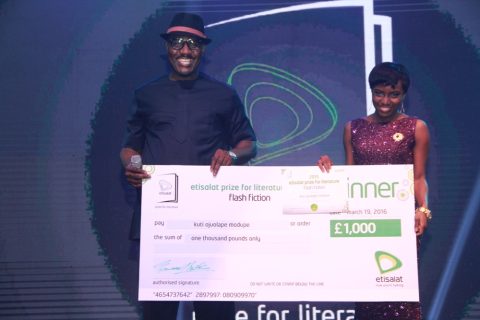
The Etisalat Prize for Literature is a pan-African award that strives to nurture emerging writers on the continent and support the African publishing industry. Although the prize began with a focus on books, it also now includes a flash fiction award for stories of 300 words or fewer.
Virgie Townsend recently had the pleasure of interviewing the winner of the 2015 Etisalat Prize for flash fiction, Kuti Ojuolape Modupe. Ojuola, a writer and medical student in Nigeria, shared how she wrote the winning story “Gone,” her literary influences, and how she balances creative work with a career in medicine.
Congratulations on winning the Etisalat Prize for Literature for Flash Fiction! What inspired “Gone”?
Thank you for your kind words. I wish I could say there was some epic backstory to “Gone,” but there really isn’t. “Gone” was me trying to push myself to write something I had never tried before. It was me writing from a man’s point of view. It really was my way of saying, men feel things and get heartbroken too and that’s okay.
I love that the Etisalat has a special category for flash fiction. How did you learn about it and decide to enter your piece?
I learnt about the Etisalat Flash Fiction category via Twitter methinks. That was two years ago and I found out when it was too late and entries were closed. So I tried again last year after my friends encouraged me to go for it. I remember thinking, what are the odds my story gets anywhere? I wrote a piece to send in after many days of being blank and really just hoped for the best.
You’re a medical student as well as a creative writer, which some people might find surprising. How do you balance your creative writing with your work in medicine? Do you feel like the two fields complement or conflict with each other at times?
Medical school is quite the challenge, I’ll admit. Truth is there are moments in there where I barely have time for myself but there are also freer times. So it’s really about knowing when to put in all the work and when to relax. Writing calms me, especially when I’m overwhelmed. I’ve been writing since I was about 11 so even medical school can’t separate me from it. And honestly, I see science and art as a continuum. It doesn’t end somewhere and pick up somewhere else for me. Even in the science, I see the art. And I’m grateful for that gift.
Who have been your biggest influences as a writer? Do you have any reading recommendations for us?
I’ve been heavily influenced by a wide variety of writers, starting from Mary Higgins Clark who got me interested in writing at all to Stephen King who made me realise there really are no rules to writing. I was about 16 when I started to focus more on African writers and I have a lot of respect for Teju Cole and Taiye Selasi. They made me see writing in an entirely different way. I absolutely recommend Taiye Selasi’s Ghana Must Go and Margot Dalton’s Tangled Lives.
Tell us a little about your writing process. How do you approach writing a piece of flash?
I think writing flash comes easier to me because I like to think I’m a simple person. Haha. I feel like there’s so much more in saying less. My writing process is usually triggered by something I see or hear. And a sentence plays around in my head. So I write it down somewhere so I can come back to it when I’m not so busy. It’s a visual process for me where I see the characters in my mind and the story slowly plays out in my head as I write. I think it’s important to visualise your characters because if you can’t, how will the reader be able to as well? There’s also a lot of soul-pouring.
Now that you’ve won the Etisalat for flash, where do you want to take your writing next?
The big question. What next? I’ll keep writing, definitely. I have a blog that keeps me writing. Writing a book is definitely on my bucket list and hopefully, I’ll get around to it.

Follow Ojuola on Twitter at @Ojuolaape_ and the Etisalat Prize at @etisalatreads. Read the rest of the Etisalat’s 2015 flash fiction finalists on ID Africa’s website.

 The core workshop of SmokeLong Fitness is all in writing, so you can take part from anywhere at anytime. We are excited about creating a supportive, consistent and structured environment for flash writers to work on their craft in a community. We are thrilled and proud to say that our workshop participants have won, placed, or been listed in every major flash competition. Community works.
The core workshop of SmokeLong Fitness is all in writing, so you can take part from anywhere at anytime. We are excited about creating a supportive, consistent and structured environment for flash writers to work on their craft in a community. We are thrilled and proud to say that our workshop participants have won, placed, or been listed in every major flash competition. Community works.